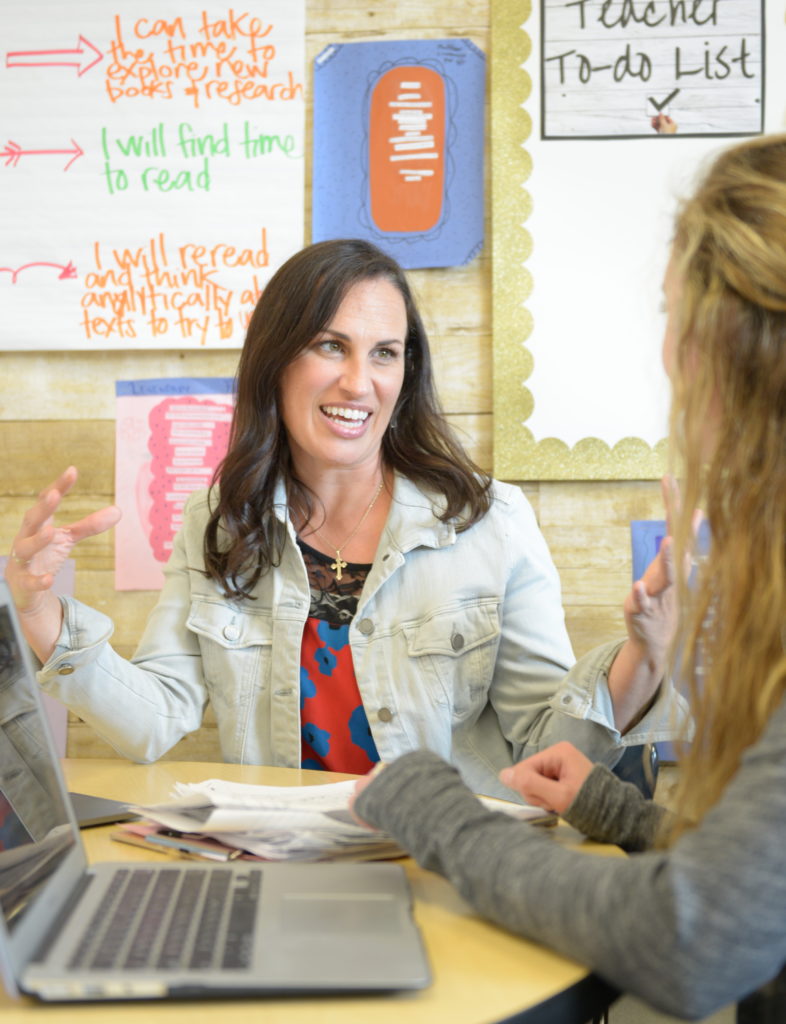Photos by Scott Buschman
It’s mid-May, but pouring rain dictates that recess will be held in the classroom at Martin Luther King Elementary School in Oakland. Aasha Trosper joins her second-graders in a dance called the Floss. Students are surprised she has heard of it — and shocked she can perform it with gusto. Afterward, they create memory books on their iPads, graphing out their favorite things. One of their favorites, unsurprisingly, is Trosper.

“She’s cool,” says a student.
“She’s amazing,” explains another.
“She’s so fun,” say several.
This cool, fun and amazing teacher is a member of Generation
Z, whose oldest members have recently entered the workforce, or are on the
brink of doing so. Currently, CTA counts about 650 Gen Z members (some
members choose not to disclose their age when they sign up). More are expected
to join this fall.
Born between 1995 and 2012, Gen Z has never known a world
without smartphones, Amazon and social media. They’ve experienced the Great
Recession, terrorist plots and fake news. They’re a huge cohort: Gen Z will
make up 24 percent of the global workforce by 2020. While there has been lots
of research on millennials, little has been invested in understanding Gen Z.
There are key differences between what motivates Gen Zers in
their career and how they expect to be treated in the workplace, says
California Faculty Association member Jean Twenge, psychology professor at San
Diego State University, who refers to them as iGen. Twenge is author of iGen:
Why Today’s Super-Connected Kids Are Growing Up Less Rebellious, More Tolerant,
Less Happy — and Completely Unprepared for Adulthood.
“Businesses and managers need to take note,” says Twenge. “A new generation is arriving at your doorstep, and its
members might not be what you expect.”
Here’s what educators should understand about their Gen Z
colleagues.
They’re not millennials
Miyuki Manzanedo, born in 1995, once considered herself a millennial because people called her that. Then people called her a “post-millennial.” Now she strongly identifies with Gen Z.

Gen Z entered school after standardized testing became part of the state accountability system in 1998. “No Child Left Behind [in 2001] created a lot of anxiety among us because there was always testing, testing, testing,” says Manzanedo, former president of Student CTA. “I think that’s one reason why we have more anxiety and need more reassurance.”
According to Twenge, while Gen Z is generally creative and
tech-savvy and advocates for social change, they’re also stressed out and
anxious. They’re more practical and cautious than millennials. They have a good
work ethic and want job security, having seen the economy collapse when they
were youngsters. Saddled with debt, they worry about the future.
While millennials were labeled the “entitled” generation,
Gen Z doesn’t feel entitled to anything, says Manzanedo.
Twenge’s research shows that Gen Z is experiencing high
levels of depression, anxiety, loneliness and suicide. It began in 2007,
coinciding with the skyrocketing usage of smartphones and social media.
Gen Z members are growing up more slowly than millennials
did, with adolescence an extension of childhood instead of an entryway into
adulthood, reports Twenge. Younger Gen Zers are delaying dating, getting their
driver’s licenses and working. Older ones are delaying getting married, having
children and moving away from their parents.
They connect with students and the world
Gen Z teachers can relate to their students, because they
are also Gen Z. For example, they understand that Momo — a scary-looking
cartoon figure linked to a viral hoax — evokes terror in young people. They
understand the pressure of trying to look perfect on social media, cyber
bullying, FOMO (fear of missing out), and other stressors their students face.
“We bring a level of empathy and compassion to the
profession,” says Manzanedo. “We draw on our own experiences.”

“We relate to the kids and understand their jokes and pop
culture references,” says Trosper, an Oakland Education Association member.
“And we use an egalitarian style of teaching, treating them as if they are
equals instead of making powerful demands.”
Gen Z sees things from a global perspective and is socially
conscious, says Erin Githens, Student CTA secretary-treasurer, who recently
graduated from CSU Fullerton.
“We see how issues overlap each other and try to find a
successful solution. For example, the issue of systematic racism overlaps with
public education’s institutional racism. And if we want our students to do
well, it’s best to address both issues and not one over another.”
Having grown up with the Great Recession, climate change and
school shootings, Gen Z teachers want to make a difference, says Githens.
“I’ve always felt that public schools were a way to
transform communities, and that through teaching, I can be an agent of change.”
They face economic hardship
College is more expensive than it was for previous
generations, and Gen Z is paying the price. Moving out of their family’s home,
driving their own car and dining out are among the top expenses that they are
willing to sacrifice. In more expensive areas of the state, new teachers live
dormitory-style in apartments with roommates or with their parents.

“It’s a very hard time to be a teacher economically,
politically and emotionally,” says Trosper. “Most of us disregard the idea of
owning a house any time soon. Most of us are living with roommates.”
Brandon Giovannoni, vice president of Student CTA at CSU
Stanislaus, wakes up early to attend class, even when he has worked past
midnight the night before.
“Most of us are broke, even if we have a degree,” says
Giovannoni, who will receive his credential in 2020. “I live with my parents. I
don’t rely on them for financial help. But I have bills that don’t allow me to
live on my own.”
He resents that Gen Z is labeled as lazy or only concerned
with social media.
“We get a bad rap for being us. We just need time to figure
out life. Ideas have changed, and are still changing rapidly. It’s scary to
think that in a year, I am going to be teaching young minds. So we just need
all the support and feedback we can get.”
They see tech as the solution
Gen Z teachers are engaging students with technology in the
classroom.
Trosper’s students use Minecraft, a game where students
overcome obstacles, and create a storyboard on how to solve problems.
“We believe in project-based learning, gamification of
curriculum, and getting kids to interact with technology in a purposeful way,”
says Trosper, who earned her master’s degree with a focus on digital learning.
Technology allows her the freedom to scaffold her lessons.
Instead of creating three different lesson plans or worksheets, she can build
different levels into lessons on iPads and Chromebooks, instantly assessing
student progress. Integrating technology and differentiating instruction is
invaluable with a class that includes students with IEPs and English learners.
Raquel Chavira, a second-year kindergarten teacher at
Caswell Elementary School in Ceres, loves Seesaw, a program where students
record themselves so parents can see what they have learned. The youngsters can
decide whether to post recordings of themselves on classroom “threads” in this
age-appropriate social media platform.
“Our generation easily engages students with technology,”
she says. “Using a program like Zearn for math, where students play games and
go to the next level at their own pace, is fun.”
Like previous generations, Gen Z educators strive for
classroom management skills that allow for fun, but keeps them in control. This
is typically learned on the job — but technology helps. Chavira, for example,
uses ClassDojo, an app that offers points for good behavior and allows parents
to see instantly how their children behave on any given day.
But sometimes in-person support is helpful.
“I went to the CTA New Educator Weekend and took a workshop
on classroom management, which I’ve found challenging,” says Chavira, Ceres
Unified Teachers Association. “There was good information on helping students’
social and emotional well-being.”
They expect instant results
Gen Z educators want to know immediately if students
comprehend a lesson, so they can change direction if necessary.

At Hidalgo Elementary School in Brawley, for example, Edith
Alvarez Garcia uses a wireless pencil on a handheld tablet to draw math figures
and equations, which are transmitted by the Apple TV app to a projector on the
ceiling and displayed on a screen. She uses Educreations, an interactive
whiteboard tool that allows her to annotate, animate and narrate nearly any
type of content on the fly, based on her students’ answers.
Next, she asks students to log in to Quizizz, an online
program with free gamified quizzes. Teachers can pick an existing quiz or
create their own. Students compete for the top three spots posted. Meanwhile,
her tablet reveals privately who understands the lesson and who is struggling.
“I love the immediate feedback. I love being able to
implement new ideas. Our generation is comfortable with technology and how to
integrate devices and apps to make our instruction more engaging and
captivating. And we are very lucky that our district provides all the
technology tools, support and training we need.”

Across town at Myron D. Witter Elementary, her husband
Francisco Garcia uses Pear Deck, a Google-compatible program that allows him to
create and present interactive slides. Students can instantly join the
presentation right from their device.
His students use Plickers cards to answer multiple-choice
math questions. Each card has a scannable code that identifies the student;
students simply rotate their card to the letter A, B, C or D, and the
teacher scans the cards with his smartphone camera. The Plickers app
immediately displays the students’ answers on a screen.
These Gen Z teachers are changing the way things are done in
their district, says Maryann Vasquez Moreno, co-president of the Brawley
Elementary Teachers Association, of which the Garcias are
members. “Although they are new to the profession, they are doing amazing
things with technology. They have completely impressed their principals,
superintendent and our school board.”
Gen Z teachers are often considered tech experts at their
school sites. Most don’t mind helping veteran teachers who are technologically
challenged; it makes them feel helpful and valued.
“Our generation brings efficiency with the utilization of
technology,” says Garcia, who is beginning his second year. “We are not afraid
to jump in and learn. We try to be as productive as possible. And it’s all for
the benefit of our students.”
They’re OK with students’ phones
Gen Z educators are more willing to allow students to use
their smartphones and iPads in the classroom, says Laura Hernandez-Flores of
the New Teacher Center in Santa Cruz, which trains mentors to work with new
teachers.

“Generation X and millennial teachers often tell students to
put their phones away because they are distracting, while Generation Z teachers
have learned how to implement and integrate them into teaching and learning.”
Sarah Landis, who mentors new teachers in Pleasanton, has
seen this firsthand. She was delighted at the creativity of a young teacher who
asked students to create Instagram profiles of Great Gatsby characters.
“You might as well leverage what kids are doing anyway,”
says Landis, a member of the Association of Pleasanton Teachers. “I’ve found
that younger teachers are more comfortable with the technology kids use,
instead of feeling scared or intimidated.”
Cellphone apps eliminate the need to buy expensive graphing
calculators, dictionaries and other items. They can record lectures and convert
talk to text for note-taking. Gen Z educators capitalize on all this, but must
also make sure students’ phones are used for learning and not playing.
They question the status quo
Landis has worked with many new teachers over the years as a
coach in the TriValley Teacher Induction Project and as a K-12 professional
development coach, thanks to training from the New Teacher Center. She
appreciates that Gen Z teachers question the status quo and embrace diversity.
“They definitely have a willingness to use their voice. For
example, they are questioning the traditional literature being taught, in hopes
to expand the reading list to include more current readings and represent
diverse cultural perspectives.”
Landis tells them to listen to their inner voice and that
it’s OK to do things differently from the way they’ve always been done. She
wants newbies to learn from veterans, but also to share.

She is proud that second-year English teacher Cassidy Booe
is already demoing a lesson on writing narratives at Hart Middle School in
Pleasanton.
“I’m so glad veteran teachers want me to share what I’m
doing and learning,” says Booe, a member of APT. “Our generation is more
willing to try different things, and if we fail, it’s OK. We were raised in a
growth-mindset way.”
Sometimes Gen Z-style teaching can look different from the
typical classroom, she admits.
“I think my generation is actively trying to break the mold.
We are intentionally creating classrooms that may be a little louder and maybe
a little more interactive. We are putting an emphasis on interactive learning
that’s different than direct instruction. But just because our classrooms are a
little louder doesn’t mean we are off task or goofing off.”
They’re taking control of their professional development
Gen Z prefers texting to talking, and email or Google
Hangout to meetings. They are extremely collaborative, but they don’t always
need to collaborate in person.
“We don’t need as many formalities,” says Trosper. “We’re
fine having instant communication on text or emails. And we want more of a
voice in our professional development.”
Indeed, Gen Z educators are taking more responsibility for
their professional development, says Landis. Instead of waiting to be told what
they need, they send her blog posts or articles they have seen online, asking
her to help them implement new ideas.
“They can look at Twitter daily and discover things they
want to try. Their style of learning looks different, and they want to make
sure what they are learning is relevant to what they are doing.”
Hernandez-Flores of the New Teacher Center says that without
being asked, Gen Z teachers send mentors videos of themselves teaching and
request feedback, which never happened with millennials. But Gen Z members
think nothing of it, since they are used to sharing their lives online via
social media, and see it as a way to grow as professionals.
They support unions
According to techrepublic.com, 46 percent of Gen Z members are freelancers. While providing flexibility, gig-economy jobs lack security, benefits and a reliable income, which Gen Z values because it represents safety and security.

That may be one reason why unionism is being embraced by Gen
Z workers.
“Jobs are precarious, health care costs are skyrocketing,
and wages aren’t keeping up with the cost of living — no wonder young
people are organizing,” writes Michelle Chen in The Nation,
noting that workers age 35 and under are the main component of an unprecedented
surge in union membership over the past two years. Nationwide in
2017, nearly 860,000 workers under age 35 got hired, and nearly a quarter
of those were union jobs.
“Gen Z is not afraid of the word union,” says Manzanedo.
“New teachers and those entering the profession are signing up in large numbers
for union membership. It helps that the union is expanding from
bread-and-butter issues to student-centered issues.”
The power of unions has been noticed by Gen Z teachers, who
closely followed the strikes in Los Angeles, Oakland and New Haven. Some, like
Trosper, went on strike.
“We saw that CTA was fighting on behalf of students,” says
Manzanedo. “Teachers took a stand, so their students could get the education
they deserve. Generation Z has buy-in. We understand that together, we are
stronger.”
This is the second part of a special report on Gen Z. For part one (on younger Gen Zers), go to californiaeducator.org/generation-z-a-new-cohort-comes-of-age.
Support Gen Z educators
- Treat them as colleagues. Explains one Gen Zer: “Sometimes veterans have a deficit way of looking at younger people as if we were blank slates that needed to be filled up, rather than looking at what we know.”
- Keep an open mind to their new ideas. Give them a voice.
- Offer lots of feedback. Give careful instructions and expect that they will need more guidance.
- Let Gen Z educators know they are in a safe environment and that you want to help them succeed.
- Reduce the time at formal meetings and increase virtual and informal learning encounters. Text or communicate electronically for little things.
- Offer them the professional development (such as CTA conferences and trainings) and technology resources they need to succeed.
- Allow time for collaboration.
- Go visual. They prefer image-based information and would rather see than read about an issue. FAQs and YouTube-style tutorials are among their favorite ways to learn, along with problem-solving.
- Don’t automatically expect them to be the “technology person” on-site. Make sure they are not too overwhelmed themselves before they are tasked with helping others.
- Don’t assume that if they are on their phones, they aren’t working. It’s very likely they are.
- Communicate that their local CTA chapter supports and appreciates them. Ask if their needs are being met. Explain what CTA has to offer.
From a variety of online sources and Gen Z members.
Data



The Discussion 0 comments Post a Comment